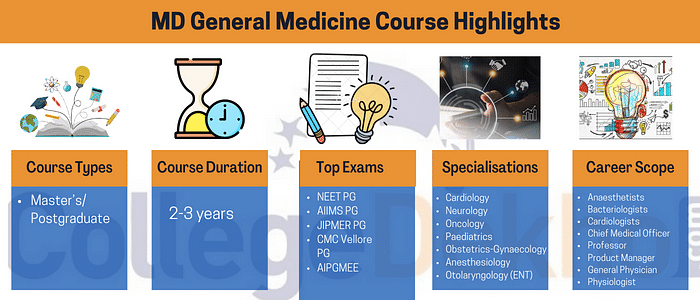MD General Medicine
MD General Medicine Course Overview
Doctor of Medicine in General Medicine, also known as the MD General Medicine programme is a 2-3 years of postgraduate medical degree that focuses on detecting and treating common health conditions or illnesses. The curriculum also focuses on teaching students about developments in illness diagnosis and treatment technologies through experimentation, observation, theoretical understanding, and practical experience.
The primary goal of the MD General Medicine course is to equip students to diagnose and treat medical disorders, handle medical crises, conduct research, and offer quick emergency diagnosis and care.
Admission to MD General Medicine courses in India is based on merit and entrance exams. Aspirants must have an MBBS degree with at least 55% aggregate grades, as well as admission exam scores (such as NEET PG, AIIMS PG, etc.) and other key eligibility requirements. Furthermore, there is no specified age limit for getting admission to MD General Medicine courses in India.
Some of the best colleges to study this course in India are AIIMS Delhi, Kasturba Medical College, Aligarh Muslim University, CMS Vellore, and more. The scope of MD General Medicine courses in India is sky-high.
Aspirants can either opt for higher education in India or abroad after completing an MD General Medicine degree or can kickstart their medical career. The most popular job prospects that aspirants can pursue include General Physicians, Product Managers, Professors, and more. The average estimated starting salary for graduates is around INR 4 to 6 lakh per annum. Let us learn more about MD General Medicine courses here.
Table of Contents
- MD General Medicine Course Overview
- MD General Medicine Course Highlights
- Why Choose MD General Medicine?
- How MD General Medicine Can Fetch a Rewarding Career?
- MD General Medicine Entrance Exams
- MD General Medicine Course Eligibility Criteria
- How to Get an Admission to an MD General Medicine Course?
- Popular MD General Medicine Colleges in India
- Popular MD General Medicine Colleges Abroad
- What is MD General Medicine Course Fee?
- MD General Medicine Course Syllabus
- MD General Medicine Important Subjects
- MD General Medicine Course Structure
- MD General Medicine Teaching Methodology in India
- MD General Medicine Scope in India – Higher Studies, Career and Job Prospects
- What is MD General Medicine Salary?
- Skills Required in MD General Medicine Courses
- FAQs about MD General Medicine
MD General Medicine Course Highlights

Here is a quick rundown of some of the important highlights and facts about the MD General Medicine courses for aspirants to look at:
| Course | MD General Medicine |
|---|---|
| Full Form | Doctor of Medicine in General Medicine |
| Degree Level | Postgraduate |
| Duration | 2 to 3 years |
| Exam Type | Semester-based |
| Minimum Qualification Requirement | An MBBS/BAMS degree from a recognised university with a minimum aggregate score of 50%-60% + entrance exam scores + 1-year compulsory internship |
| Average Starting Salary | INR 4-5 lakh per year |
| Average Fees Incurred | INR 2-15 lakh in Government colleges and more in private colleges |
| Selection Process | Entrance + Merit-based |
| Popular Entrance Exams | NEET PG, AIIMS PG, JIPMER PG, CMC Vellore PG, AIPGMEE |
| Top MD General Medicine Courses Specialisation | Cardiology, Neurology, Oncology, Paediatrics, Obstetrics-Gynaecology, Anesthesiology, Otolaryngology (ENT) |
| Minimum Aggregate Percentage Required for Admission | 50%-60% in MBBS/BAMS |
| Top Recruiters | Medanta, Sharda Hospital, AIIMS, Fortis Healthcare, MAX Healthcare, Indian Council of Medical Research, Apollo Hospitals, Jaypee Healthcare Limited, Meditrina Hospitals Private Limited and more |
| Career Prospects | Anaesthetists, Bacteriologists, Cardiologists, Chief Medical Officer, Professor, Product Manager, General Physician, Physiologist, Clinical Laboratory, Scientist, Dermatologist, ENT Specialist and more |
Why Choose MD General Medicine?
To understand why one should choose to pursue MD General Medicine after an MBBS degree, we need to understand why one should take a postgraduate course MBBS.
Aspirants or medical practitioners have exposure to numerous sectors of surgery and medicine during their MBBS degree. It is a bachelor's degree programme that provides a comprehensive understanding of several specialities. Doctors and medical students, on the other hand, must pursue a specialisation after graduating with MBBS to become surgeons or specialists in their chosen field of study.
Doctor of Medicine (MD) is a degree that helps medical students in becoming specialists in their chosen field of study.
It goes without saying that as post-graduate medical professionals, medical practitioners will be in greater demand in the healthcare sector. No patient would want to see an MBBS graduate for a dermatology-related health issue. They would look for an MD-level specialist.
While MBBS offers promising employment opportunities, candidates must have certain abilities in a profession. Aspirants may get ideal diagnostic abilities, confidence, responsibility, and superior communication ability with extensive knowledge in the subject, such as MD General Medicine. As a result, the career graph would naturally have an upward trend with specialisation through MD General Medicine courses.
How MD General Medicine Can Fetch a Rewarding Career?
A medical practitioner with an MD General Medicine degree has a wide range of job options in the healthcare business. This training can help graduates get into a variety of new and exciting careers. An MD in General Medicine degree programme can lead to exciting employment opportunities in both the public and commercial sectors.
The Doctorate of General Medicine, or MD, has become one of the most popular medical degrees in recent years. The course teaches the skills and information required to begin a career as a medical practitioner and a private consultant for professional growth and development.
Here are some key elements to help understand how MD General Medicine programmes may lead to a satisfying career for medical professionals:
MD General Medicine is in high demand since they are the creators of new medical health care innovations.
Students in the Doctorate of General Medicine (MD) postgraduate programme obtain a broad variety of medical knowledge and experience.
MD General Medicine Entrance Exams
Passing an entrance exam is one of the most important eligibility/admission requirements to get admission into a renowned medical college to pursue MD General Medicine courses for aspirants. Mentioned below are some of the most acceptable and opted entrance exams that are required for pursuing an MD General Medicine programme:
-
National Eligibility cum Entrance Test (NEET) PG
-
AIIMS PG Entrance Exam
-
CMC Vellore PG Entrance Exam
-
All India Post Graduate Medical Entrance Examination (AIPGMEE)
-
Institute of National Importance Combined Entrance Test (INI-CET)
-
Foreign Medical Graduates Examination (FMGE)
-
PGIMER Entrance Exam
-
Uttar Pradesh Common Entrance Test (UPCET)
-
Diplomate of National Board Centralized Entrance Test-Super Specialty (DNB-CET)
MD General Medicine Course Eligibility Criteria
Mentioned below is the general admission and eligibility criteria for medical students to pursue MD General Medicine courses in India:
-
Candidates must have an MBBS degree or PG diploma in Medicine or equivalent from an MCI approved and recognized college/university.
-
The students must have got at least 50%-60% aggregate marks in their undergraduate.
-
Entrance exam scores (like NEET PG, AIIMS PG, etc.) that are accepted by the university.
-
At least 6-12 months of compulsory internship
How to Get an Admission to an MD General Medicine Course?
The admission procedure for MD General Medicine in India takes place either on campus or online. Applicants must meet the MD General Medicine eligibility and admission requirements, which are a combination of their MBBS degree course marks and scores obtained in the entrance exam. The following are the numerous ways for obtaining admission to the MD General Medicine course:
Aspirants interested in studying MD General Medicine can apply online or offline.
Aspirants can apply for the programme by obtaining an admission form from the university or college website.
Aspirants will be called to attend a written exam, personal interview, group discussion, and counselling round after completing the college or university application form.
Following a written test, personal interview, counselling, and group discussion, the aspirants are assigned seats based on several MD General Medicine eligibility criteria met by the aspirants
Popular MD General Medicine Colleges in India
Enlisted below are some of the most popular and renowned medical colleges in India for aspirants to pursue MD General Medicine courses:
| College/University Name | Location |
|---|---|
| All India Institute of Medical Sciences (AIIMS) | New Delhi |
| Jawaharlal Institute of Postgraduate Medical Education and Research (JIPMER) | Pondicherry |
| Kasturba Medical College | Mangalore |
| Integral Institute of Medical Sciences and Research | Lucknow |
| Aligarh Muslim University | Uttar Pradesh |
| King George's Medical University | Lucknow |
| Christian Medical College | Vellore |
| Armed Forces Medical College | Pune |
| Maulana Azad Medical College | New Delhi |
| Madras Medical College | Chennai |
| Bangalore Medical College and Research Institute | Bangalore |
| St Johns Medical College | Bangalore |
| IMS BHU - Institute of Medical Sciences Banaras Hindu University | Uttar Pradesh |
| Hamdard Institute of Medical Sciences and Research | New Delhi |
| Dr D Y Patil Medical College Hospital and Research Centre | Pune |
| Shree Guru Gobind Singh Tricentenary University | Haryana |
| GSMC Mumbai - Seth GS Medical College | Mumbai |
| DMCH Ludhiana - Dayanand Medical College and Hospital | Punjab |
| KIMS Bangalore - Kempegowda Institute of Medical Sciences | Bangalore |
| SRM Medical College Hospital and Research Centre | Chennai |
| AIMSR Hyderabad - Apollo Institute of Medical Sciences and Research | Hyderabad |
Popular MD General Medicine Colleges Abroad
Here is the list of top colleges for medical aspirants who wish to pursue MD General Medicine courses abroad:
College/University Name |
Location |
|---|---|
|
University of Calgary |
Canada |
|
University of Alberta |
Canada |
|
University of Montreal |
Canada |
|
McGill University |
Canada |
|
University of Melbourne |
Australia |
|
Australian National University |
Australia |
|
University of Sydney |
Australia |
|
University of Queensland |
Australia |
|
University of Auckland |
New Zealand |
|
Victoria University of Wellington |
New Zealand |
|
University of Otago |
New Zealand |
|
University of Waikato |
New Zealand |
|
University of Oxford |
United Kingdom |
|
University of Cambridge |
United Kingdom |
|
Imperial College London |
United Kingdom |
|
University College London |
United Kingdom |
|
Columbia University |
United States |
|
Harvard University |
United States |
|
Stanford University |
United States |
|
Yale University |
United States |
What is MD General Medicine Course Fee?
The MD General Medicine course fees can vary from one university/institute to another depending upon various factors like the type of the university (whether it is government or private), the duration of the course, location, course curriculum, ranking, reputation/goodwill and more. The table mentioned below highlights the minimum and the maximum estimated average fees for MD General Medicine courses in India:
Course |
Fees in Government Colleges |
Fees in Private Colleges |
|---|---|---|
|
MD General Medicine |
INR 5,00,000 - INR 29,00,000 |
INR 15,00,000 - INR 87,00,000 |
MD General Medicine Course Syllabus
The semester-by-semester syllabus for MD General Medicine differs from university to university. However, the essential disciplines at all universities and colleges remain the same. As a result, below is a quick description of the MD General Medicine curriculum for medical students:
1st Year
Diseases Concerning General Medicine |
Diagnostic Investigation And Procedures |
|---|---|
|
Recent Advances in Medicine |
Applied Basic Science Knowledge |
|
Biostatistics And Clinical Epidemiology |
- |
2nd Year
Counseling Patients And Relatives |
Ward Patient Management |
|---|---|
|
Research Proposal |
OPD Patient Management |
|
Monitoring Seriously Ill Patients |
Ability To Carry Out Research |
3rd Year
Long And Short Topic Presentations |
Journal Conferences |
|---|---|
|
Ward Rounds, Case Presentations, And Discussions |
PG Case Presentation |
|
Clinico-Radiological And Clinicopathological Conferences |
Research View |
MD General Medicine Important Subjects
MD General Medicine courses are designed to familiarise medical students and practitioners to the many strategies used by doctors to better treat patients. The MD curriculum includes essential disciplines, subjects and topics like applied fundamental science knowledge, diagnostic investigation and procedures, emergency department patient treatment, and many more. The MD General Medicine programme is designed to give students the opportunity to pursue a career of their choosing. Some of the core and optional courses that medical students will study are mentioned below:
Core Subjects
-
Diagnostic Investigation and Procedures
-
Diseases Concerning General Medicine
-
Biostatistics and Clinical Epidemiology
-
Research Review and Thesis
Elective Subjects
-
Physiology
-
Pharmacology
-
Biochemistry
-
Pathology
-
Community Medicine
-
Microbiology
-
Anatomy
-
Pediatrics
MD General Medicine Course Structure
The MD General Medicine syllabus and course curriculum span two to three years and are divided into four to six semesters, which include core and optional courses. The following are some details about the MD General Science course structure:
4 to 6 semesters (depending on the course length)
Core subjects
Electives/optional subjects
Practicals and laboratory
Projects
Dissertation
Internship (if granted)
MD General Medicine Teaching Methodology in India
The teaching methodology and techniques used in India differ from those used elsewhere. However, each medical institute and college in India has its unique teaching approach, techniques, and standards. Furthermore, the MD General Medicine course curriculum contains a variety of teaching methods and approaches that assist applicants in understanding a variety of subjects taught in class. The following are some of the many teaching strategies and techniques used in the MD General Medicine course curriculum by colleges:
-
Laboratory sessions
-
Practical learning
-
Experiment study
-
Guest Lectures, Seminars, and Workshops
-
Group Assignments and Discussions
-
Industrial visits and tours
-
Research and Development
-
Teaching undergraduate
-
Use and maintenance of biomedical equipment
-
Long and short topic presentations
-
Research review
MD General Medicine Scope in India – Higher Studies, Career and Job Prospects
As previously indicated, the inclination of applicants toward specialised degrees has created a market shortage for General Medicine practitioners. Physicians and speciality doctors who can identify and treat common disorders are in great demand in hospital outpatient departments and clinics. Furthermore, the field provides versatility in more ways than one.
Scope of Higher Education
Higher education opportunities abound for MD General Medicine graduates, with top wages available in India and abroad in practically all corporate and public sectors of diverse organisations. MD General Medicine is a highly sought-after degree in the employment market. Medical practitioners who have finished MD in General Medicine courses have a wide range of work prospects, but they can also choose to continue their education. Students can pursue higher education options or degrees available to students including:
-
Master in Surgery (MS)
-
PhD in General Medicine
-
Super Speciality Medical Course/Degree
Job Prospects and Career Opportunities
After earning an MD General Medicine degree, graduates are free to pursue a variety of professional options in the healthcare field, which are in high demand, especially in light of the COVID-19 epidemic. Students with an MD General Medicine degree will find employment in the healthcare sector at government and private hospitals, as well as private clinics. Some of the most popular and trending job opportunities for graduates are mentioned below:
Job Prospects |
Description |
|---|---|
|
General Physician |
General practitioners or physicians are well-equipped to diagnose and treat non-surgical ailments or illnesses, and when surgery is necessary, he refers the patient to a specialist. |
|
Surgeons |
Surgeons perform operations on patients to repair injuries like broken bones, illnesses like malignant tumours, and abnormalities like cleft palates. There are two types of physicians with comparable degrees: MD (Doctor of Medicine) and DO (Doctor of Osteopathic Medicine). |
|
Dietitian |
A registered dietician is a type of healthcare professional that specialises in nutrition. This training qualifies them to provide nutritional guidance. A dietitian will extensively examine the patient’s eating habits throughout medical nutrition therapy. |
|
Internists |
An internist is a specialist in internal medicine. They are doctors who specialise on the internal organs and systems of the body, but their knowledge does not stop there. They can also provide preventative care and treat a variety of conditions ranging from skin rashes to ear infections. |
|
Pediatrician |
A paediatrician evaluates children who are sick, wounded, or disabled. Patients should be referred to expert specialists for examinations. recommend medicine, surgery, or treatments Parents and children should be informed about the diagnosis and treatment plans. |
|
Anesthesiologists |
Anesthesiologists analyse, monitor, and oversee patient care prior to, during, and after surgery, as well as dispense anaesthetic, head the Anesthesia Care Team, and ensure optimal patient safety. |
|
Bacteriologists |
Bacteriologists research the growth, development, and other features of bacteria, as well as their positive and negative impacts on plants, animals, and people. |
|
Gynaecologist |
A gynaecologist specialises in caring for a woman's reproductive health from the time she receives her first period until she reaches menopause. A gynaecologist diagnoses and treats disorders affecting the reproductive system. |
|
Physiologist |
A physiologist is a specialist who understands the physiological functioning (chemical and physical) of humans and their organs. A physiologist studies how organs function, how they respond to external substances, and so on. |
Some more job prospects for MD General Medicine graduates are listed below:
-
Medical Officer
-
Professor
-
Scientist
-
House Officer/RMO
-
Product Manager
-
General Medicine Consultant
Top Recruiters
Hospitals, nursing homes, medical research centres, pharmaceutical firms, medical institutes/colleges, and medical institutions/colleges are the top recruiters for MD General Medicine course graduates. The following is a list of the top recruiters in this field.
-
Medanta Hospitals
-
Sharda Hospitals
-
Fortis Healthcare
-
Jaypee Healthcare Limited
-
Max Hospitals
-
Apollo Hospitals
-
AIIMS
-
Fortis Hospitals
-
CIPLA Ltd.
-
Religare Health Insurance Company Ltd.
-
Indian Council of Medical Research
-
Sun Pharmaceuticals Industries Ltd.
-
Adecco India Private Limited
What is MD General Medicine Salary?
MD General Medicine graduates earn between INR 3 Lakhs and INR 36 Lakhs per year in India, with an average yearly pay of INR 11 Lakhs for medical practitioners after a particular level of experience and exposure. The table below highlights the average estimated salary of MD General Medicine graduates with respect to their level of experience:
Years of Experience |
Average Estimated Salaries in INR |
|---|---|
|
1-2 |
4,00,000-6,00,000 |
|
2-3 |
8,00,000 |
|
3-4 |
9,00,000 |
|
4-5 |
10,00,000 |
|
5-6 |
15,00,000 |
|
6-7+ |
23,00,000+ |
Disclaimer: These are average estimated salaries of MD General Medicine graduates. The salary can be different for different medical professionals based upon various factors like their job type, job responsibilities, nature of work, where they are working, location and more.
Skills Required in MD General Medicine Courses
MD General Medicine course graduates must possess the following enlisted skills to kickstart their medical career:
-
Critical decision-making skills
-
Diagnostic investigation and procedures
-
Counselling patients and relatives
-
Research and analysis skills
-
Leadership and management skills
-
Communication and networking skills
-
Core knowledge of the basic concepts
-
Desire for continued learning
FAQs about MD General Medicine
Who should pursue MD General Medicine courses after MBBS?
Individuals who are interested in learning the fundamentals of the human body, its functioning, as well as the diagnosis and treatment of disorders, might consider enrolling in the MD General Medicine programme. Any student interested in a tough career in medicine, whether as a surgeon, a medical director or a speciality such as a gynaecologist or an anesthesiologist, etc., should choose this programme.
Is NEET compulsory to pursue an MD General Medicine course?
Yes, to gain admission to an MCI-approved and recognised medical college or institute and pursue a degree in MD General Medicine, candidates must pass the NEET PG entrance test, which is widely regarded and demanded by universities across India as a basic qualifying criterion. Furthermore, all government and private medical colleges in India accept NEET and undergraduate scores for admission.
How long is MD in General Medicine courses for?
The duration of MD General Medicine programmes or courses varies with respect to multiple factors like university type, course curriculum, programme/degree type and more. Having said that, generally, the MD General Medicine course is 2-3 years of postgraduate medical course that focuses on general medicine and illness diagnosis by examination of organs, tissues, physiological fluids, and complete bodies.
When can we do MD in General Medicine?
MD General Medicine programme is a 2-3-year postgraduate medical study in India w ich requires an MBBS degree with minimum aggregate marks as specified by the institute (generally 50%-60%) along with scores of entrance exams accepted by the university and work experience of at least 6 months.
Which college is best for MD General Medicine in India?
Some of the top and most reputed colleges for medical aspirants to pursue MD General Medicine courses are Christian Medical College, Vellore; St Johns Medical College, Bangalore; All India Institute of Medical Sciences, New Delhi; Kasturba Medical College, Mangalore; Armed Forces Medical College, Pune; Madras Medical College, Chennai; Lady Hardinge Medical College, New Delhi and more.
What can I do after MD General Medicine?
MD General Medicine course graduates can either go for higher studies right after completion of their MD programme or can decide to work as a medical practitioner in various government, private hospitals, clinics, health centres, laboratories and more. Aspirants can also choose to pursue higher education or postgraduate courses like PhD, MS, Super Speciality Medical Course/Degree in a particular specialisation like cardiology, endocrinology, hepatology, gastroenterology, etc.
What comes under General Medicine?
General medicine treats practically all acute and chronic disorders, such as fever, asthma, heart disease, liver difficulties, hypertension, neurological problems, and other maladies. General medicine treats and manages a wide range of long-term ailments, such as diabetes and respiratory disorders, as well as shorter-term health issues, such as skin conditions.
Who earns more MD or MS?
There is a huge difference in the salary range between MS (Master of Surgery) graduates and MD graduates. An MBBS graduate is expected to earn somewhere between INR 30,000 and INR 1 lakh per month, much as in most other disciplines. However, in India, an MD graduate can earn INR 2-20 Lakhs, whereas an MS graduate can earn INR 4-35 Lakhs.
Is MD better than MBBS?
In every manner conceivable! Medical students in India begin with an MBBS degree. Its completion indicates the level of training necessary to become a licenced physician. An MD degree is a more advanced post-graduate degree for specialist study. Thus, an MD General Medicine degree is more advanced and valuable than an MBBS degree.
What are some of the upcoming trends in General Medicine?
General medicine is a branch of medicine that has seen tremendous change in recent years. Some notable developments have occurred as a result of the fast integration of technology in different sectors of general medicine. The following are some of the emerging developments in the industry that have the potential to revolutionise the overall healthcare landscape:
-
Smart Monitoring Devices
-
Remote Patient Monitoring
-
Artificial Intelligence (AI)
-
Blockchain Technology
Related Questions
Popular Courses
- Courses
- MD General Medicine


















